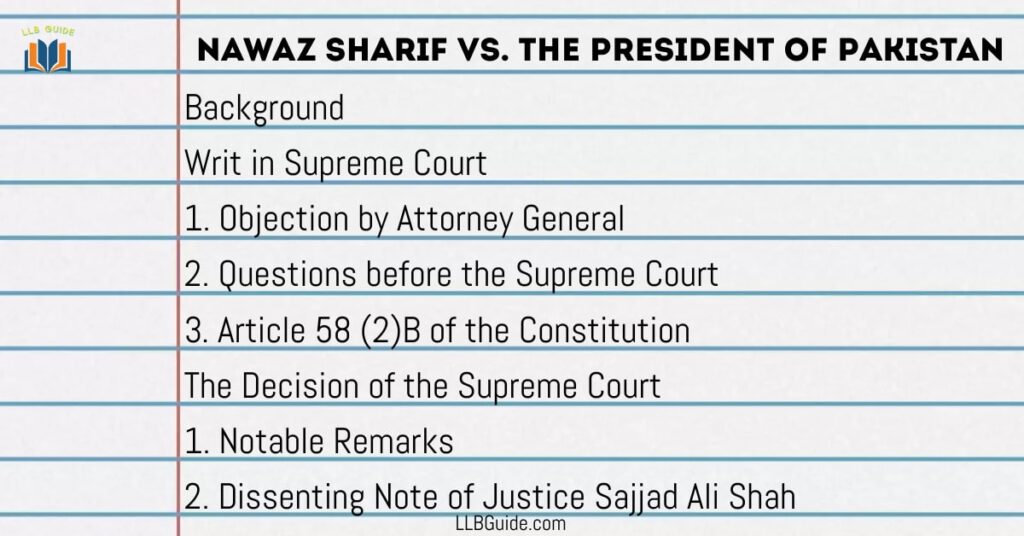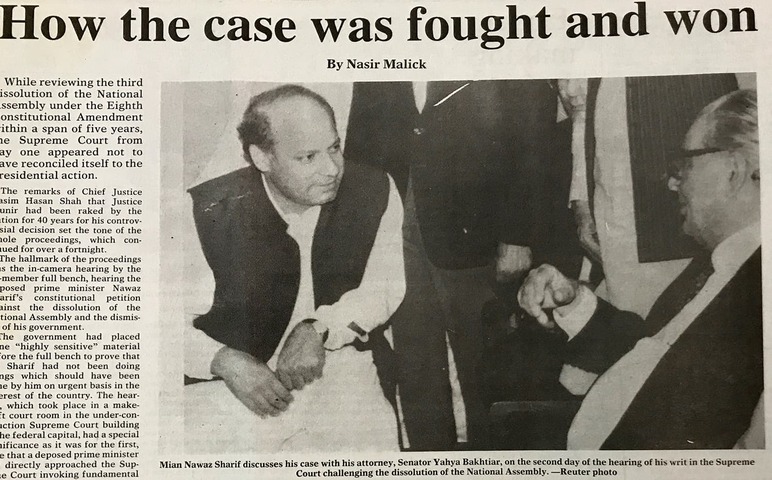In Nawaz Sharif Vs. The President of Pakistan Case, Prime Minister Mian Muhammad Nawaz Sharif filed a writ petition in the Supreme Court of Pakistan and challenged his dismissal as Prime Minister and the dissolution of assemblies by the act of President Ghulam Ishaq Khan.

Table of Contents
Nawaz Sharif Vs. The President of Pakistan PLD 1993 SC 473
The leading constitutional case, Nawaz Sharif Vs The President of Pakistan case is explained below in very simple words.

Background
On the 24th of October 1990, general elections were held in Pakistan, and IJI led by Mian Muhammad Nawaz Sharif got the majority and secured 106 seats. Resultantly Mian Muhammad Nawaz Sharif became the Prime Minister of Pakistan for the very first time.
From day one there was a power struggle between Prime Minister Mian Muhammad Nawaz Sharif and President Ghulam Ishaq Khan on who is more powerful. Because at that time the President had the power to dismiss the Prime Minister under Article 58 (2)B of the 1973 Constitution of Pakistan.
In March and April 1993, disputes between Prime Minister Mian Muhammad Nawaz Sharif and President Ghulam Ishaq Khan were at their peak.
In a meeting on the 14th of April 1993, President Ghulam Ishaq Khan asked Prime Minister Mian Muhammad Nawaz Sharif to improve the governance of his Government and maintain law and order. He also demanded the resignations of some of his cabinet members.
After three days on the 17th of April 1993, Prime Minister Mian Muhammad Nawaz Sharif spoke to the Nation, and in his speech, he said that he would not dissolve the assemblies or give resignation and take dictation from anyone.
Afterward, on the 18th of April 1993, Benazir Bhutto presented the resignations of 88 members of the Pakistan Peoples Party to President Ghulam Ishaq Khan. After these resignations, President Ghulam Ishaq Khan had apprehension that an impeachment motion may be moved against him in the National Assembly.
On the same day, President Ghulam Ishaq Khan spoke to the Nation. He made the allegations of mismanagement of finances and corruption in the Government of Mian Muhammad Nawaz Sharif. He also said that the Government is not functioning according to the provisions of the Constitution.
President Ghulam Ishaq Khan issued an order Named “Dissolution of Assemblies”, in which he dismissed Prime Minister Mian Muhammad Nawaz Sharif and dissolved the assemblies. He also appointed Balakh Sher Mizari as the caretaker Prime Minister.
Writ in Supreme Court of Nawaz Sharif Vs. The President Of Pakistan Case
Mian Muhammad Nawaz Sharif challenged such dismissal in the Supreme Court of Pakistan. He filed a writ petition under Article 184 (3) of the 1973 Constitution of Pakistan.
Article 184 (3) describes the Original Jurisdiction of the Supreme Court, where it has the power to make an order on a question of public importance with reference to the enforcement of any of the Fundamental Rights.
This appeal was heard by the member bench of the Supreme Court which was headed by Chief Justice Naseem Hassan Shah.
Objection by Attorney General
The Attorney General objected to this petition, he said that maybe this is a matter of public importance but no one’s fundamental rights have been violated. The President of Pakistan has used his power to dissolve the assemblies, given to him under Article 58 (2)B of the Constitution. So, this petition is not maintainable.
Questions before the Supreme Court
The Supreme Court had to determine the following two questions under this petition:
- Whether this petition is maintainable under Article 184 (3) of the Constitution?
- Whether the President has exceeded his powers to dissolve the assemblies or not?
Article 58 (2)B of the Constitution
Article 58 (2)B states the dissolution of the National Assembly.
“Notwithstanding anything contained in clause 2 of Article 48, the President may also dissolve the National Assembly in his discretion, where in his opinion a situation has arisen in which the Government of the Federation cannot be carried on following the provisions of the Constitution and an appeal to the electorate is necessary”.
Article 58 (2)B has been repealed by the 18th amendment in the Constitution.
The Decision of the Supreme Court
On May 26, 1993, the Supreme Court passed the Judgment in Nawaz Sharif Vs. The President of Pakistan Case. It was a ten-once judgment. Only Justice Mr. Sajjad Ali Shah wrote his dissenting note and dis-agreed from the majority judgment.
The Supreme Court overruled the objection raised by the Attorney General and decided that:
- The President has violated Articles 14 and 17 which describe fundamental rights,
- The President has also restrained the Prime Minister from performing political activities in FATA under Article 17 (2).
Notable Remarks
In this judgment, Chief Justice Naseem Hasan Shah said that although the Prime Minister holds his office with the pleasure of the President the President cannot dismiss the Prime Minister until he gets the majority of the members of the Parliament.
He also said that the Prime Minister is responsible to the Parliament not to the President, so the President cannot dismiss him and dissolve the assemblies.
Justice Muhammad Rafiq Tarard said: that the President has no power to dismiss the cabinet of his own, sub-article 5 and article 191 provide that the Prime Minister shall hold the office during the pleasure of the President but the President shall not exercise his power unless he satisfies that the Prime Minister does not command the confidence.
Justice Muhammad Afzal Loan said: that the President may dissolve the assemblies on only two conditions:
- Where a vote of no-confidence is passed against the Prime Minister and no one else gets the majority to become a Prime Minister,
- Where the Government is not functioning according to the Constitution.
Dissenting Note of Justice Sajjad Ali Shah
In his dissenting note Justice Mr. Sajjad Ali Shah said that the Supreme Court is only bound to interpret the Constitution but not to be involved in legislation. He also said that in this majority judgment, the interpretation of the constitution given by the Supreme Court disregarded the power of the President under Article 58 (2)B, and in the future, no President will be able to dissolve the Prime Minister or assemblies.
Conclusion
In Nawaz Sharif Vs President of Pakistan Case, the Supreme Court of Pakistan passed an important judgment that restored the assemblies and Government, and Mian Muhammad Nawaz Sharif rejoined his office as a Prime Minister.